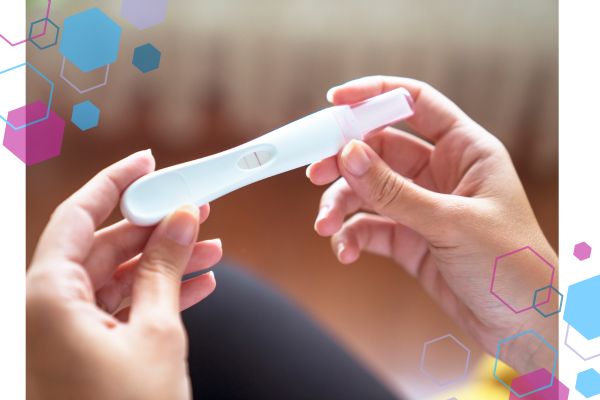
What happens to your body in the first 12 weeks of pregnancy — week-by-week changes explained
"In early pregnancy, but let's face it, throughout the whole of pregnancy, every ounce of energy you have is being split between keeping you going and building someone new. Yet so much is unseen, and therefore unnoticed." - Jilly Clarke
You might not look pregnant yet — but your body is already working harder than it ever has before.
The first trimester isn’t “just the beginning.” It’s a complete system rewire: hormones rising, circulation shifting, digestion slowing, ligaments softening, organs moving, and your brain quietly preparing for the role ahead.
Even if all you feel is exhaustion, nausea, or emotional turmoil — it’s because your body is in the middle of the most intense phase of change, and hardly any of it is visible on the outside.
Let’s make it visible.
What happens to your body in the first trimester (and why it feels so intense)
Your blood volume rises early — and keeps rising
By around 12 weeks, your blood volume has already increased by around 10–15%. That number continues climbing throughout pregnancy, reaching 40–50% above your baseline. Even this early shift can leave you breathless, dizzy, or aware of your heartbeat in a way you haven’t been before — your circulation is already adapting to meet the needs of two.
Your hormones surge fast — and affect everything
• hCG rises rapidly after implantation — it’s the hormone detected on pregnancy tests, and it maintains progesterone production so the uterine lining doesn’t shed.
• Progesterone slows digestion and relaxes smooth muscle, which is great for keeping the uterus relaxed, sustaining the pregnancy but not so great for bloating as it also slows down the muscles needed for digestion!
• Oestrogen increases blood flow, heightens sensory awareness, and influences mood and brain chemistry.
This is why you might feel foggy, overstimulated, reactive, repulsed by previously normal foods or smells, or deeply exhausted — without doing anything “wrong.”
Digestion slows down — which is helpful and uncomfortable
Your gut slows to absorb more nutrients, but that also means more gas, more bloating, and sometimes constipation. You might feel fuller after a few mouthfuls, then hopelessly hungry an hour later.
Ligaments start softening early
Relaxin enters your system long before birth is even on your radar. This helps your pelvis gradually adapt to future change, but it can also cause mild instability or twinges earlier than expected.
Your organs are already shifting
By the end of the first trimester, your uterus — now roughly the size of an orange — is nudging your bladder and bowels. That’s why you’re peeing more and feeling mild pressure or stretching sensations before anything is visible.
Your baby is still tiny. But your body’s workload is enormous.

First trimester symptoms: what’s normal, what’s real and what it feels like
You’re not imagining this. Your body has already changed.
Here’s how people often experience it across the first 12 weeks:
Weeks 4–6: Something has changed — even if no one can see it
• Your period doesn’t come, and you feel “off”
• Fatigue arrives like a freight train
• A heavy, dragging feeling settles in your pelvis or lower back
• Your brain feels foggy; simple tasks feel enormous
• You feel like you need sleep after every meal
Your body already recognises this pregnancy — even if your mind is only just catching up.
Weeks 6–8: The intensity peaks
• Nausea becomes routine (or all-consuming)
• Smells turn into triggers you didn’t sign up for
• Bloating leaves you wondering if it’s too early to unbutton jeans
• You might feel emotional — touchy, tearful, overstimulated
• Everything feels a bit too much, and you may not remember the last time you felt “normal”
This is often the hardest part. You don’t “look pregnant,” but you’ve never worked harder in your life.
Weeks 8–10: You feel pregnant — even if no one knows
• You notice your waistband feels tight by mid-afternoon
• Standing up too quickly can make the room spin
• You might wake up at night feeling hot, thirsty or unsettled
• You feel full after a few bites — digestion just isn’t what it used to be
• You may think: “Maybe I didn’t expect it to feel like this.”
You’re more physically changed than you look. Your whole system is adjusting.
Weeks 10–12: Something shifts (unevenly, imperfectly)
• The placenta begins taking over hormone production
• Energy may come back in small bursts
• Hunger can become stronger or more specific
• Nausea might reduce, shift, or linger for weeks yet
• Emotionally, you might swing between relief and anxiety
• Your brain might say “I should feel better by now,” but your body is still working
This is often a confusing milestone. The world treats 12 weeks like an ending; in reality, it’s just the end of the steepest climb.

Why you feel so strange when “nothing looks different”
Your brain chemistry is changing.
Your nervous system is adapting - Like you walking into a café and instantly knowing someone’s wearing strong perfume, even though no one else reacts. Your body tightens, your stomach flips, and you’re hit with the urge to step back, even though it’s just a scent in the air. Your nervous system is being primed, alert to everything, all at once.
Your circulation is evolving.
Your immune system is modulating.
Your organs are relocating - Like you sitting down after lunch and noticing your waistband pressing in a way it didn’t yesterday. You shift positions, unbutton, tuck a hand against your lower belly because something just feels… occupied. You haven’t grow, but it feels like something inside you has shifted enough that your body is the first to notice.
Every ounce of energy you have is being split between keeping you going and building someone new.
That’s why you break down over snacks - like when you open the cupboard, realise the only thing you can tolerate is one very specific biscuit, and someone has eaten it. And suddenly you’re crying over a Digestive as if it’s a personal betrayal.
That’s why a smell can ruin your day.
That’s why you can feel fine one minute and flattened the next - like when you’re halfway through a conversation, nodding along, and then a wave of exhaustion drops through your body so sharply you have to sit down before your legs decide for you.
It’s not “in your head.” It’s in your body — and it’s real.
How to support your body in the first trimester
(without fixing, controlling or making yourself feel like you’re failing)
• Eat little and often — plain carbs, yoghurt, fruit, crackers, whatever works. Baby will get everything they need, just stomach what you can and think more about nutrition when you feel up to it.
• Stay hydrated — even small sips. Water, ice, diluted juice, ice lollies...
• Move gently — short walks, pelvic-friendly stretches, light movement to support circulation. This one is my number one.
• Rest early — don’t wait until you crash
• Limit massive sensory input — smells, noise, screens, lights
• Ask for support early — you don’t need to “prove” anything by waiting for a scan
• If you have energy, learn about your body and how it is perfectly designed to do pregnancy and birth without you having any input at all. Modern life means we sometimes need to give it a helping hand, to help undo imbalances; but the sooner you start to understand the whole process, the easier everything becomes.
Your body is doing the work. Your job is to support it, not overperform through it.

When you understand what’s happening, early pregnancy feels different
When you have a map, you don’t feel lost. You stop wondering if you’re making a fuss. You stop comparing yourself to people who “had no symptoms.” You stop gaslighting your own body.
That’s exactly why I created the CubCare First Trimester Course
It gives you:
• Week-by-week breakdowns like this
• Tools for nausea, fatigue, cramps and anxiety
• Breath, positioning and movement videos for real discomfort
• Emotional grounding and language that makes you feel safely held, not talked down to
• Lifetime access — because support shouldn’t have a time limit
• All of it: just £29
It’s accessible, evidence-based, and built for people who want clarity now — not when the bump appears.
It’s not a “nice-to-have.” The first trimester is the foundation.
And you deserve support that honours what you’re already holding
Explore the CubCare First Trimester Course
Because knowing what’s happening inside your body changes everything about how you live through it.

